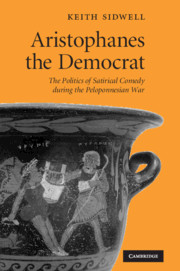Conclusions and consequences
Published online by Cambridge University Press: 27 January 2010
Summary
The argument of this book proceeded from an analysis of the revised Clouds parabasis identifying its audience as an intellectual/political group which had sponsored Aristophanes' plays since his debut in 427. It moved via a re-examination of the consequences of that analysis for the politics and thus comic techniques of Eupolis and Aristophanes, to a reading of the plays of the Peloponnesian War, both extant and fragmentary, on the basis of two major assumptions which appear to underlie Aristophanes' remarks to his sponsors: a play's characters are its major theme and attacks on rivals are regularly made by misappropriation of their comic material (of every type and at every level of detail). Both assumptions bring into play serious challenges to the way in which we generally read this material. The second is, however, not especially problematic, unless combined with the first. No sensible reader of Old Comedy is likely to deny tout court the possibility that metacomedy was more prominent than we may have thought, since there is so much actual evidence for the criticism of rivals (e.g. Cratin. fr. 213, Ar. fr. 58 etc.). But the idea that the characters constitute the focus of the comedians' attacks because they represent real individuals, disguised for the most part because of the danger that open attack posed to the poet (cf. Ach. 377f., Wasps 1284f.) is much more disturbing, first because it represents a contemporary filter which would fundamentally change the interpretation of almost every play and second because positivistic notions of what constitutes evidence for the interpretation of the comedies will always in some scholars' eyes trump arguments, however strong, which are not based on what is directly reported.
- Type
- Chapter
- Information
- Aristophanes the DemocratThe Politics of Satirical Comedy during the Peloponnesian War, pp. 299 - 302Publisher: Cambridge University PressPrint publication year: 2009



